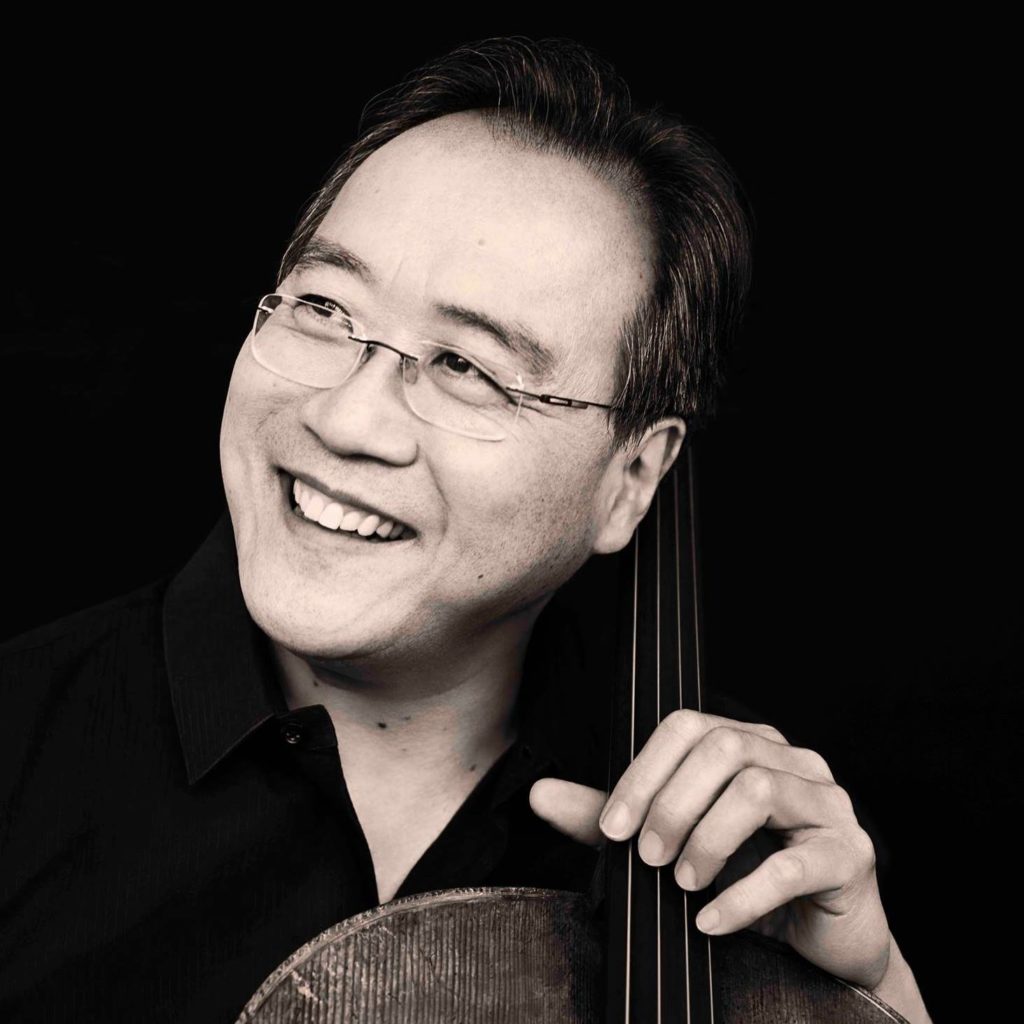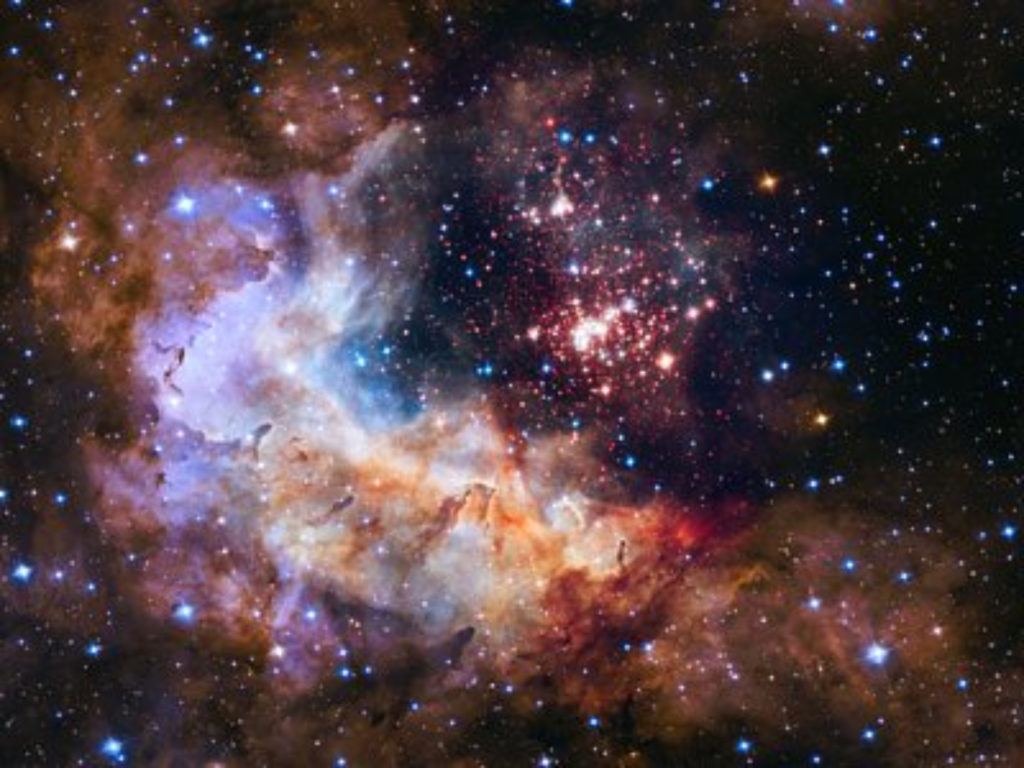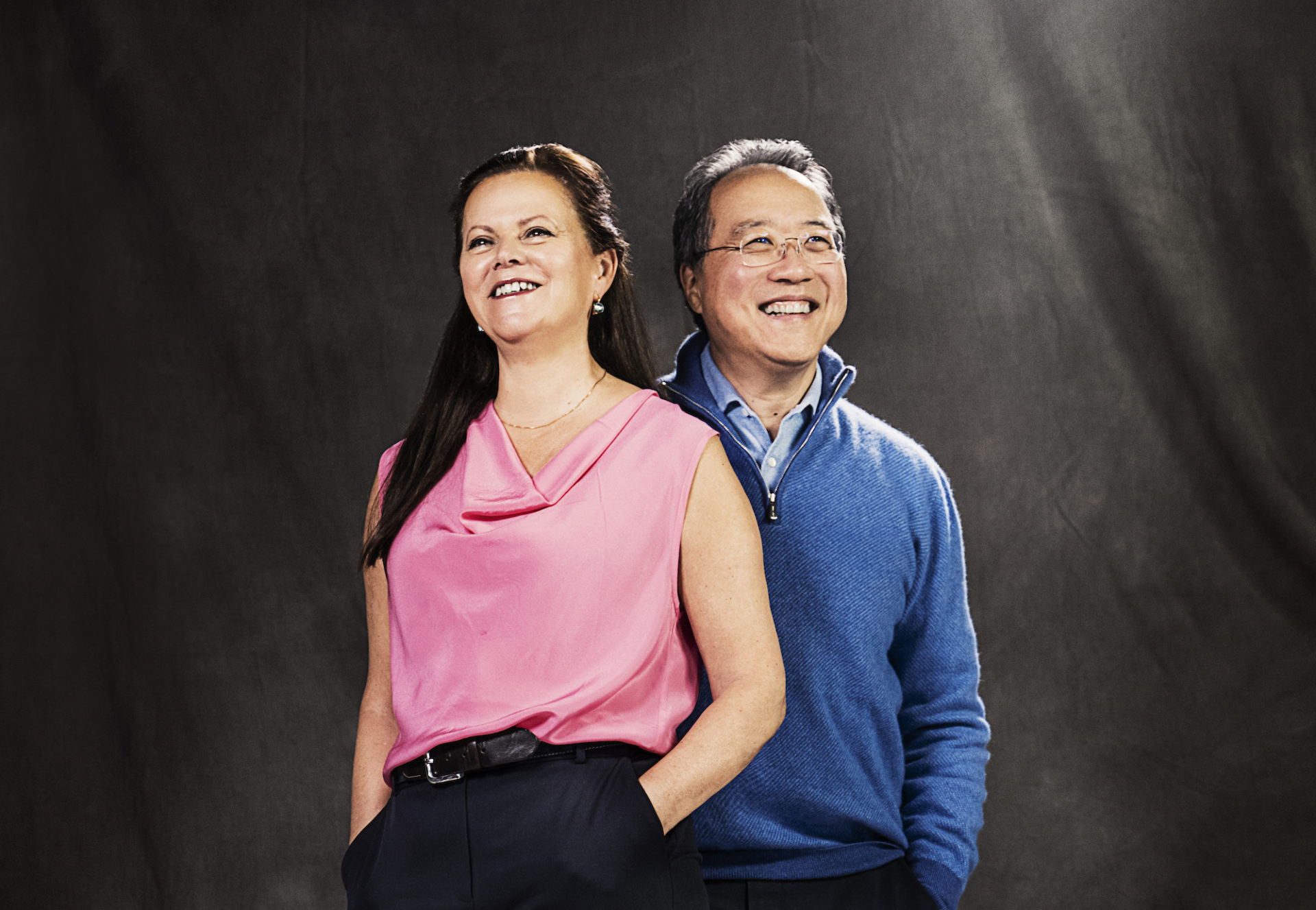I’ve been in the room with a handful of musical icons. My Aunt Molly took me to see Elvis Presley in 1976; I snuck out of the house to see Prince in 1982 at the Fox in Atlanta. The theatre nerd that I am, I adored Liza Minnelli at the Sunrise Theatre in Florida in 1987 when she could still belt out every phrase from Cabaret. I’m talking global icons. And this past weekend, I added a couple more to the list: Yo-Yo Ma and the incomparable Kathryn Stott. Their performance at Krannert Center for the Performing Arts’ Foellinger Great Hall was, to quote the very nice ladies sitting next to me, “sublime.”

What more is there to say about Yo-Yo Ma? He’s the embodiment of genius and a global icon who crosses genres and generations. As the full house gathered in KCPA’s perfectly lit lobby, I was struck by the diversity in the audience. Of course, there were plenty of enthusiastic retirees enjoying a glass of wine and catching up with friends. But the crowd also included families with children and students from a variety of programs and backgrounds. Cellist Yo-Yo Ma’s status as a global musician is unparalleled and the performance he and pianist Kathryn Stott gave on Saturday night brought the house down with an extended standing ovation, two encores, and five extra bows.
The sold-out performance included two pieces from French composer Gabriel Fauré (1845-1924), one of which opened the show. The simple stage, Yo-Yo Ma, his cello, subtly-sequined Stott at the grand piano, with her astute page-turner on her left. I’m not a classical music expert by any means, but opening with Fauré’s Berceuse, op 16, was an interesting choice. Berceuse, in French, means “lullaby” or, more literally, “cradle song.” The opening felt like we were gently placed into their ongoing musical conversation. Stott’s keystrokes were soft and the audience was lulled into this threesome on stage: the cellist, the pianist, and the song. But there was a fourth member at this performance — the grand space inside Foellinger’s Great Hall.
After the first set of songs, Yo-Yo Ma greeted the audience and commended our Great Hall. “It’s extraordinary,” he noted, microphone in hand, smiling that inimitable smile at the audience. “I love to come here, to this hall. I know of no place quite like it. Such a beautiful space.” He went on to discuss the four-decades-old collaboration with English pianist Kathryn Stott. “We’ve shared forty years of our creative life together.” At the end of this year, Stott plans to retire from touring and this was one of their final performances together. A bittersweet vibration infused their music choices and their onstage chemistry. They’ve recorded together many times, notably, their pandemic collaboration Songs of Comfort and Hope (2020), which grew out of the YouTube recordings Yo-Yo Ma offered during those dark days of the COVID shutdown.
Saturday’s concert elevated that same pervasive spirit of hope. Ma poignantly shared his gratitude for Stott’s collaborative generosity over the years. “These last decades with Kathy have been transformative. Kathy’s chosen this program to emphasize the idea of metamorphosis. In metamorphosis, we discover that nothing is more important than the gift of life. And life is the one thing that gives us our greatest creative act. We want to explore how the circle of life is transmitted.” After this brief, quite touching, moment, Ma noted, “Now, we move into a work that speaks truth to power.” They launched headlong into Dmitri Shostakovich’s Sonata for Cello and Piano in D minor (1934). A dynamic piece, it showed off Stott’s skills with gushing arpeggios and scaler runs aplenty. The robust interaction of piano and cello is front and center in this sonata. At some moments, the cello is hushed, waiting to return to the conversation. And in other moments, the piano holds a brief breath as the cello pushes the melody. Stott is the embodiment of the consummate pianist and she shines even brighter in the space with the world’s cellist.
After a brief intermission, the pair returned and Stott introduced their next piece, Estonian composer Arvo Pärt’s Spiegel im Spiegel (1978). Translated as “mirror in mirror,” the piece, as Stott described it, has moments where “whenever there are two notes ascending, two will be descending, then three ascending and three descending. It’s subtle and simple, without clutter. I like to compare this music to white light that is completely full of all colors.” Pärt composed the work just before he was forced to flee Soviet Estonia and it evokes that sense of quiet longing. Stott and Ma brought the composition to life beneath a large screen on which images from the Hubble and James Webb telescopes were projected. At the end of this softer and somewhat melancholic work, Ma again spoke to the audience, “These images from the Hubble and James Webb telescopes represent the best of us. When thousands of people collaborate and bring together every part of their heads, hearts, hands, passion, vision, and knowledge, that is the best of our humanity.”
You can’t be in a room with Yo-Yo Ma without smiling with him. Even the casual observer will note the light he carries in his face every moment he is with his cello. Here, he and Stott play “Over the Rainbow” and the camera beautifully captures Ma’s inner light and Stott’s impeccable generosity. YouTube cannot capture the dynamic you experience watching a concert unfold live at Foellinger Hall, but it gives you a taste of the creative abundance these artists engender.
As I sat in the lobby after the show jotting down my thoughts, I couldn’t capture the relationship of Yo-Yo Ma to the cello in words. Seeing him dozens of times on television or in videos, you get the sense that the cello is an extension of who he is. But that’s not it. And he doesn’t command the instrument. He doesn’t play it. He isn’t the instrument. It’s nearly impossible to describe in language. It’s mystical — it’s a song offered by the universe to a visionary human through the perfect instrument to deliver the magic. It’s the musical equivalent of those cosmic images we’ve all seen from the Hubble.

Ma and Stott concluded the evening with César Franck’s Sonata in A Major for Violin and Piano (1886), a “wedding present,” Ma noted before they began. “ This last piece of the night was a wedding present for a young violinist. As such, it represents another cycle of different views of a relationship. In that sense, it’s another kind of collaboration.” Moving from the sweet and gentle opening movement through some rather turbulent and aggressive lines, including improvisational recitatives, this final composition of the evening left the audience — literally — on their feet screaming for more.
As the KCPA 2023-24 season winds down for the semester, I was swept up by Ma and Stott’s theme of gratitude. I am grateful for all of the time and talent that goes into curating a KCPA season and grateful for the ushers, the ticket office staff, the maintenance staff who make the space so special, and, of course, the student workers serving up cocktails and cheese plates in the lobby. I look forward to finding out what the 2024-25 season holds for us.








